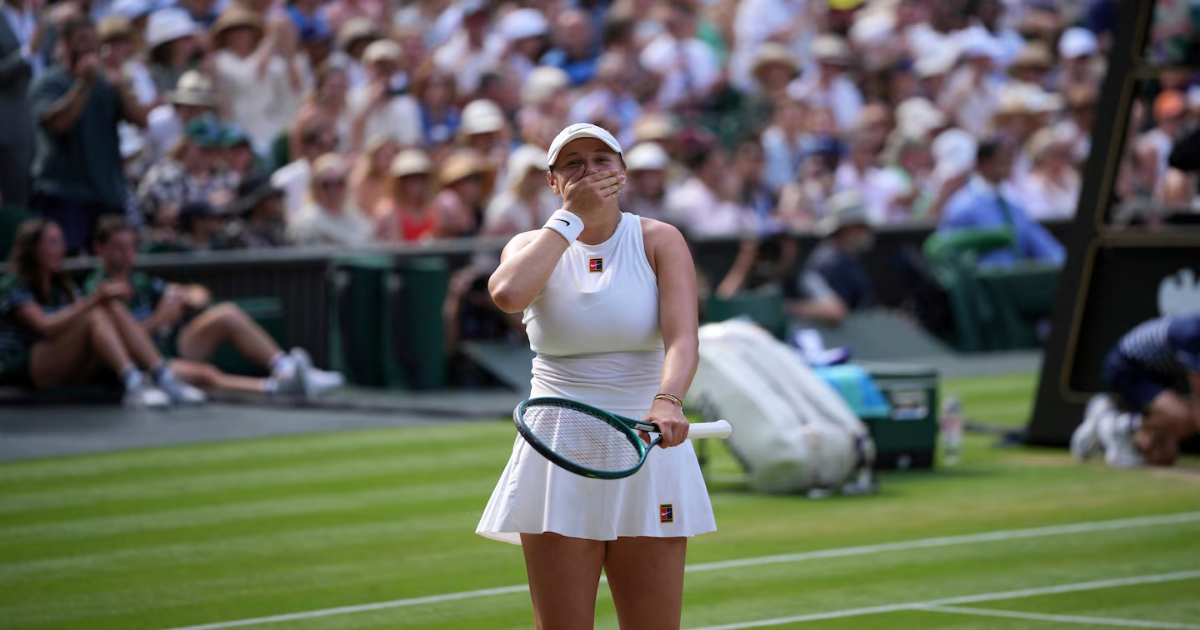WIMBLEDON, England — The whirlwind that has been Amanda Anisimova’s life for the past year paused for a moment Thursday in the warm sun. She stood briefly with her hand over her mouth, then turned to her family and laughed.
What a roundabout trip she had taken to Center Court at the All England Club, where six years after she made her first Grand Slam semifinal as a precocious teen at the French Open, she finally reached her second — and won. She outhit world No. 1 Aryna Sabalenka for a 6-4, 4-6, 6-4 victory that veered from competitive to spicy before it sent her into Saturday’s Wimbledon final against five-time Grand Slam champion Iga Swiatek.
Swiatek’s 6-2, 6-0 win against Belinda Bencic set up a meeting between two first-time Wimbledon finalists — and two somewhat unlikely contenders, given Swiatek’s self-proclaimed struggles on grass.
Still, she will have an experience edge come Saturday as a former world No. 1 who has never lost a Grand Slam final.
To Anisimova, her own arrival at the Wimbledon championship match is “a little bit unbelievable.”
When Anisimova first broke through in Paris at 17, her 2019 traipse through the draw at Roland Garros was surprising because of her youth, but almost instantly it was framed as just a taste of what was to come. Born to Russian immigrants in New Jersey, raised in South Florida and armed with the finest two-handed backhand on tour — which is still true — she was one of U.S. tennis’s most promising teenagers.
But just as her career was taking off, her father, Konstantin, died of a heart attack at 52 the week before the U.S. Open. Anisimova sat out the year’s final Grand Slam while she grieved. Four years later, in 2023, life on the tour had finally frayed her edges enough that she took eight months off to address burnout.
“I feel like that really served me,” Anisimova said this week. “Coming out of that break, it wasn’t all upward. There were definitely some ups and downs coming out of it … and just being an athlete at this level. It’s not easy.”
That might be an understatement. At the start of Wimbledon last year, she was ranked 191st, lost in the qualifying tournament and spent the past 12 months painstakingly building her strength to manage nagging injuries. The performances that flowed easily from her racket as a teen require careful preparation now, enough that Anisimova already — half jokingly — bemoans the loss of her youth.
“I’m like, ‘Whoa, I’m turning 24 this year,’” she said this week, laughing. “It’s a little bit scary.”
Terrifying. Yet somehow, her tennis is stronger than ever.
Anisimova matched Sabalenka’s intimidating power in a tight semifinal Thursday that burned for 2 hours 36 minutes and offered a peppering of drama alongside the big hitting. Both players employ strike-first tennis, and they traded cracking serves and thunderous groundstrokes while long rallies were scarce. Though Anisimova racked up more unforced errors — 42 to Sabalenka’s 37 — she also came up with the right shots at the most crucial moments of the match, whereas Sabalenka tightened. Anisimova saved 11 of the 14 break points she faced.
“I have to say that she was more brave today,” Sabalenka said. “Maybe when I was just, like, trying to stay in the point, she was playing more aggressive.”
Anisimova was undaunted by the world No. 1’s power — and by emotion. Sabalenka shouted in frustration as usual throughout the match, but she also spoke to the chair umpire after one of the few longer rallies in the second set on which she thought Anisimova celebrated before the ball landed out.
When the chair umpire spoke to Anisimova, the American put up her hands, gesturing toward her opponent, whose loud grunt is well known.
“She kind of pissed me off saying that: ‘Oh, that’s what she does all the time,’” Sabalenka said afterward. “I was grateful that she actually said that because I was, like, ‘It’s actually help me to keep fighting.’ I’m like, ‘Okay, now I’m going to show you the tennis.’”
Sabalenka broke to win the first game of the third set, but Anisimova won the next three before working her way to a 5-2 lead. She broke Sabalenka to win the final game, securing the win on the last of three match points.
“Even though I had three match points, it didn’t feel like it,” Anisimova said. “She was playing incredible and serving very well. … I tried to keep my cool and put my return in.”
Sabalenka is now 0-3 in Wimbledon semifinals and just missed out on all three Grand Slam championships this year. She lost in the final of the Australian Open to Madison Keys and the French Open to Coco Gauff. After a third American opponent sent her packing, Sabalenka walked out for her news conference and said, laughing: “Are you guys waiting for something? You’re not going to see a Roland Garros press conference me,” referring to comments she made after the French Open in which she complained about the weather and rued her mistakes while paying Gauff little credit.
When the news conference moderator asked her thoughts on Thursday’s match, Sabalenka said, “Okay, yeah, I mean, she was the better player.” Then she clasped her hands and smiled.
The pair’s battle was worthy of a little extra heat, and Sabalenka said another late-stage loss in a Grand Slam only makes her “hungrier and angrier” to win. She has one final chance this year — at the U.S. Open, on her best surface.
Anisimova, meanwhile, looks ahead to Saturday, when she will play her first tour-level match against Swiatek. She said she will try not to get caught up in the fact that it’s happening in the Wimbledon final.
